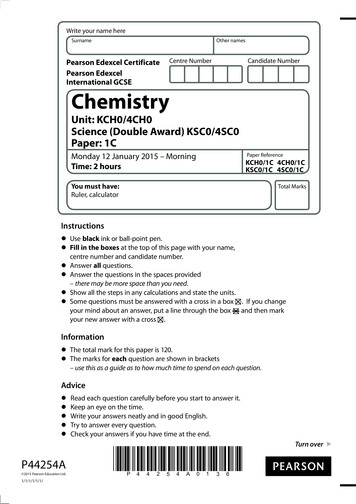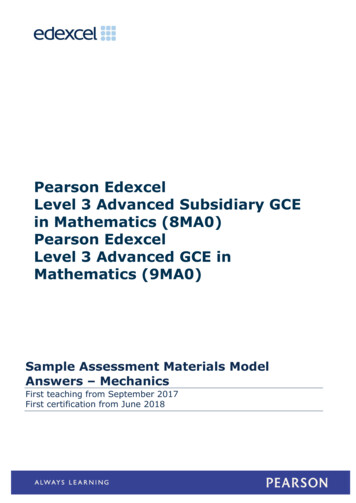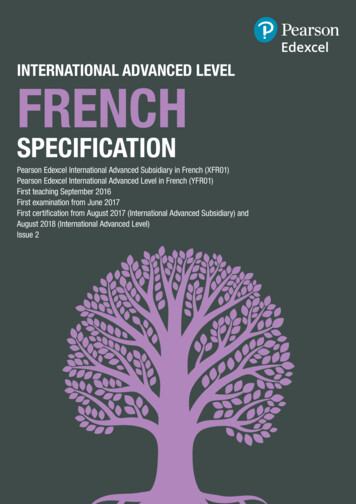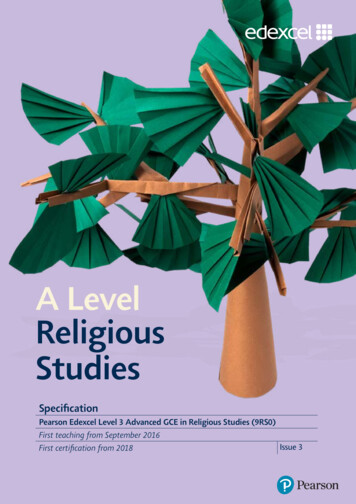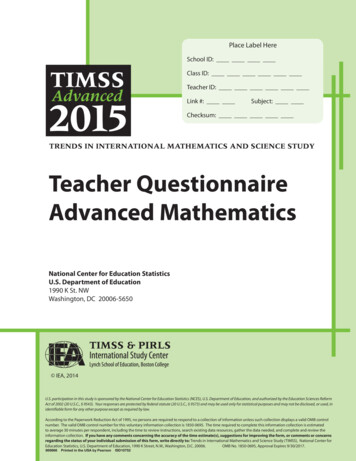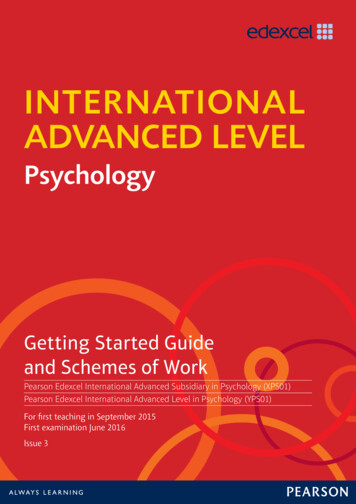
Transcription
INTERNATIONALADVANCED LEVELPsychologyGetting Started Guideand Schemes of WorkPearson Edexcel International Advanced Subsidiary in Psychology (XPS01)Pearson Edexcel International Advanced Level in Psychology (YPS01)For first teaching in September 2015First examination June 2016Issue 3
INTERNATIONALADVANCED LEVELPsychologyGetting Started Guideand Schemes of WorkPearson Edexcel International Advanced Subsidiary in Psychology (XPS01)Pearson Edexcel International Advanced Level in Psychology (YPS01)For first teaching in September 2015First examination June 2016Issue 3
Pearson Education Limited is one of the UK’s largest awarding organisations, offeringacademic and vocational qualifications and testing to schools, colleges, employers andother places of learning, both in the UK and internationally. Qualifications offeredinclude GCSE, AS and A Level, NVQ and our BTEC suite of vocational qualifications,ranging from Entry Level to BTEC Higher National Diplomas. Pearson Education Limitedadministers Edexcel GCE examinations.Through initiatives such as onscreen marking and administration, Pearson is leading theway in using technology to modernise educational assessment, and to support teachersand learners.This guide is Issue 3. We will inform centres of any changes tothis issue. The latest issue can be found on the Edexcel website:www.edexcel.com/ialReferences to third-party material made in this guide are made in good faith. We donot endorse, approve or accept responsibility for the content of materials, which may besubject to change, or any opinions expressed therein. (Material may include textbooks,journals, magazines and other publications and websites.)ISBN 9781446930977All the material in this publication is copyright Pearson Education Limited 2016
ContentsA Getting started for teachers2Introduction2Key principles2Qualification overview4Assessment objectives5Assessment guidance7Planning8Unit overviewB9Course Planner13Scheme of Work15Unit 115Unit 230Unit 350Unit 474Suggested resources95Getting started for students98Student Guide98Command words99Getting Started – Pearson Edexcel International Advanced Level in Psychology – Issue 3 – December 2016 Pearson Education Limited 20161
A Getting started for teachersIntroductionThis Getting Started guide will give you an overview of the International AdvancedLevel (IAL) in Psychology qualification and what it means for you and your students.This guidance is intended to help you plan the course in outline and give you furtherinsight into the principles behind the content to help you and your students succeed.Key principlesThe specification has been developed with the following key principles:Clear specificationClear guidance on what students need to learn, providing clarity for planning,teaching and assessment. A review of other curricula and qualifications wasundertaken to ensure that it is comparable with those taken in high-performingjurisdictions internationally. Key stakeholders were consulted on content andassessment, including higher education academics, teachers and employers toensure this qualification is suitable for an international contextProgression, not repetitionThe specification allows the development of understanding while at the same timeavoiding repetition, ensuring students are engaged and thereby inspired to developtheir knowledge.Reflect today’s global worldThe International Advanced Level in Psychology specification develops anunderstanding of current developments in Psychology.Clear assessmentsClear and consistent use of command words across assessments and between series.Our approach to assessments, definitions for the command words and details ofhow the command words are explained can be found in the glossary.Clear mark schemesThe new mark schemes provide a consistent understanding of the skills, andconnections between these skills, required for each question type. Clear wordingreflects how teachers and examiners describe the qualities of student work, so theexpectations are clear for teachers and markers.Skills for progressionThe variety of content that will be found in the examination allows the student todemonstrate knowledge as well as its application, which are required elements forfurther study or progression into employment.2Getting Started – Pearson Edexcel International Advanced Level in Psychology – Issue 3 – December 2016 Pearson Education Limited 2016
Getting started for teachers ASupport for delivering the new specificationOur package of support to help you plan and implement the new specification includes:Planning – In this guide, we have provided a course planner and scheme of workthat you can adapt to suit your department.Teaching and learning – To support you in delivering the new specification, we willbe providing suggested resource lists and suggested activities.Understanding the standard –Sample assessment materials will be provided.Tracking learner progress – Results Plus provides the most detailed analysisavailable of your students’ exam performance. It can help you identify topics andskills where students could benefit from further learning.Support – Our subject advisor service, and online community will ensure you receivehelp and guidance from us as well as enabling you to share ideas and informationwith each other. You can sign up to receive e-newsletters from the subject advisor tokeep up to date with qualification updates, and product and service news.Our subject advisor team, can be contacted with any questions in the following ways: E-mail: TeachingPsychology@pearson.com Phone: 020 7010 2190Centres may find it beneficial to review this document in conjunction with: International Advanced Level Psychology 2015 Sample Assessment Material Assessment Objective descriptors in International Advanced Level Psychology2015 specification (page 47) Mathematical Skills descriptors in Appendix D of the specification InternationalAdvanced Level Psychology 2015 (page 67-69) Taxonomy (command words) descriptors in Appendix G of the specificationInternational Advanced Level Psychology 2015 (page 77-78) Levels Based Mark Band guidance Component guides that exemplify the topics in the specification. (NEW) Summary of studies for classic and contemporary studies in each topic. (NEW) Exemplar candidate responses to SAMs material (NEW) Examiner reports on the prior examinations when available after eachexamination series 2015.coursematerials.html#filterQuery erQuery tGetting Started – Pearson Edexcel International Advanced Level in Psychology – Issue 3 – December 2016 Pearson Education Limited 20163
A Getting started for teachersQualification OverviewThis section provides an overview of the course to help you see what youwill need to teach. The overview gives a general summary of each of theexamined papers.Specification overviewThe chart below provides an overview of the course. The IAL Psychology isstructured into 4 units with 4 externally assessed examinations:Unit 1Unit 2Social and cognitive psychologyBiological psychology, learning theoriesand developmentUnit 3Unit 4Applications of psychologyClinical psychology andpsychological skillsAssessment overviewsUnit 1Unit 2External assessment: written examinationExternal assessment: written examinationTotal marks: 64Total marks: 96Weighting: 40% of the total IAS marksWeighting: 60% of the total IAS marksWeighting: 30% of the total IAL marksWeighting: 20% of the total IAL marksExamination time: 1 ½ hours4Examination time: 2 hoursUnit 3Unit 4External assessment: written examinationExternal assessment: written examinationTotal marks: 64Total marks: 96Weighting: 20% of the total IAL marksWeighting: 30% of the total IAL marksExamination time: 1 ½ hoursExamination time: 2 hoursGetting Started – Pearson Edexcel International Advanced Level in Psychology – Issue 3 – December 2016 Pearson Education Limited 2016
Getting started for teachers AAssessment objectivesThe Assessment Objectives are the same for both AS and A2 level but theweightings are different.AO1IAS 35% - 40%IAL 30% - 35%AO2IAS 30% - 35%IAL 30% - 35%Demonstrate knowledge and understanding of scientific ideas,processes, techniques and proceduresApply knowledge and understanding of knowledge andunderstanding of scientific ideas, processes techniques andprocedures: In a theoretical context In a practical context When handling qualitative data When handling quantitative dataAO3IAS 30% - 35%IAL 35% - 40%Analyse interpret and evaluate scientific information, ideas andevidence, including in relation to issues to: Make judgements and reach conclusions Develop and refine practical design and procedureGetting Started – Pearson Edexcel International Advanced Level in Psychology – Issue 3 – December 2016 Pearson Education Limited 20165
A Getting started for teachersAssessment guidanceUnit 1: Social and cognitive psychologyUnit code WPS01Externally assessedAvailability: January, June and OctoberFirst assessment: June 2016The assessment is 1 hour 30 minutes.The assessment consists of 64 marks.40% of the total IAS raw marks20% of the total IAL raw marksContent summary Topic A Social psychology Topic B Cognitive psychologyAssessment:Written examination. Students must answer all questions from three sections: Section A: Social psychology, totals 26 marks and comprises short-answer questions and one eight-mark extendedopen-response question. Section B: Cognitive psychology, totals 26 marks and comprises short-answer questions and one eight mark extendedopen-response question. Section C: comprises one 12-mark extended open-response question on either social or cognitive psychology. Calculators may be used in the examination.Unit 2: Biological psychology, learning theories and development Unit code WPS02Externally assessedAvailability: January, June and OctoberFirst assessment: June 2016The assessment is 2 hours.The assessment consists of 96 marks.60% of the total IAS raw marks30% of the total IAL raw marksContent summary Topic C Biological psychology Topic D Learning theories and developmentAssessment:Written examination. Students must answer all questions from three sections: Section A: Biological psychology, totals 34 marks and comprises short-answer questions and one eight-mark extendedopen-response question. Section B: Learning theories and development, totals 34 marks and comprises short-answer questions and one eight-mark extended open-response question Section C: comprises one 12-mark and one 16-mark extended open-response question. The 12-mark question covers either biological psychology or learning theories and development and the 16-markquestion covers both biological psychology, and learning theories and development. Calculators may be used in the examination.6Getting Started – Pearson Edexcel International Advanced Level in Psychology – Issue 3 – December 2016 Pearson Education Limited 2016
Getting started for teachers AUnit 3: Applications of psychologyUnit code WPS03Externally assessedAvailability: January, June and OctoberFirst assessment: January 2017The assessment is 1 hour 30 minutes.The assessment consists of 64 marks.20% of the total IAL raw marksContent summaryStudents must Answer all questions from Topic E and choose one of the optional Topics F or Topic G Topic E Developmental psychology Topic F Criminology psychology Topic G Health psychologyAssessment:Students must answer all questions from Section A and all questions from a choice of two topic areas in Section B.Section A: Developmental psychology, totals 32 marks and comprises short-answer questions and two eight-markextended open-response question. One eight-mark question focuses on developmental psychology and one eightmark synoptic question is based on developmental psychology and issues from Units 1 and 2.Section B: presents students with a choice of one from either criminological or health psychology. Each section totals32 marks and comprises short-answer questions and two eight-mark extended open-response questions.Unit 4: Clinical psychology and psychological skillsUnit code WPS04Externally assessedAvailability: January, June and OctoberFirst assessment: June 2017The assessment is 2 hours.The assessment consists of 96 marks.30% of the total IAL raw marksContent summary Topic H Clinical psychology Topic I Psychological skillsAssessment:Written examination. Students must answer all questions from five sections. Section A: Clinical psychology, totals 32 marks and comprises short-answer questions. Section B: Clinical psychology, comprises one 16-mark extended open-response question Section C: Psychological skills, totals 20 marks and comprises short-answer questions drawing on research methodsfrom other topic areas (except Topics F and G) Section D: Psychological skills, comprises one eight-mark extended open-response question based on the analysis ofan unseen study key question from other topic areas (except Topics F and G) Section E: Psychological skills, comprises one 20-mark synoptic question based on issues and debates from othertopic areas (except Topics F and G). Calculators may be used in the examinationGetting Started – Pearson Edexcel International Advanced Level in Psychology – Issue 3 – December 2016 Pearson Education Limited 20167
A Getting started for teachersPlanningPlanning and delivering modular IAS and IAL Courses inPsychologyThe IAL in Psychology qualification can be taught and assessed as either: d istinct modules of teaching and learning with related units of assessmenttaken at appropriate stages during the course; or a linear course, that’s is assessed in its entirety at the endDelivery modelsOne of the first decisions that centres will have to make is whether they intendto offer a sequential or thematic approach. A modular A Level will offer a moreflexible approach as topics can be selected in an order that meets the needs ofthe students.With all examinations available in January, June and October, there is flexibility forunit delivery and teaching.Suggested resourcesTo support the teaching and learning of the new specification, we have providedcomprehensive suggested resources throughout the scheme or work and a list tocapture a range of sources you may find useful on page 89.*All weblinks have been checked as active at publication, however the nature ofonline resources is that they can be removed or replaced by webhosting servicesand so it cannot be guaranteed that these sites will remain available throughoutthe lifetime of the qualification.8Getting Started – Pearson Edexcel International Advanced Level in Psychology – Issue 3 – December 2016 Pearson Education Limited 2016
Getting started for teachers AUnit overviewThe overview gives a summary of the content of each unit so that you can organise your teaching effectively.Unit 1: Social and cognitive psychologyTopicsA Social psychologyContent – Obedience, ConformityMethods – Methods – Experiments and experimental design, List A Quantitative data: calculating measures of centraltendency (mean, median, and mode) data tables (frequency tables, summary tables), graphical presentation (barchart, histogram), measures of dispersion (range and standard deviation), percentages, ratios fractions. List B Decisionmaking and interpretation of inferential statistics Levels of measurement, Wilcoxon non parametric test of difference(also covering Spearman’s test and Chi – squared once unit 2 has been covered) probability and levels of significance(p .10 p .05 p .01). , observed and critical values, and sense checking of data, one-or-two-tailored regardinginferential testing. Type I and type II errors. Scanning techniques, twin studiesStudies – Classic study, Contemporary study, one contemporary study from the following two choices; Yi Huang et al.(2014) or Haun et al (2014).Practical investigation - One practical research exercise to gather data relevant to topics covered in social psychology.The practical research exercise must adhere to ethical principles in both content and intention.B Cognitive psychologyContent – Models of memoryMethods – Experiments and experimental designStudies – C lassic Study, Contemporary study, one contemporary study from the following two choices (Darling et al al(2007) and Sacchi et al (2007) )Practical investigation - One practical research exercise to gather data relevant to topics covered in cognitivepsychology. The practical research exercise must adhere to ethical principles in both content and intention.Getting Started – Pearson Edexcel International Advanced Level in Psychology – Issue 3 – December 2016 Pearson Education Limited 20169
A Getting started for teachersUnit 2: Biological psychology, learning theories and developmentTopicsC Biological psychologyContent – Structure and function of brain regions focusing on aggression, Body rhythms,Methods – Methods –Correlational research List B Decision making and interpretation of inferential statistics Levels ofmeasurement, Wilcoxon non parametric test of difference (also covering Spearman’s test and Chi – squared once unit2 ha been covered) probability and levels of significance (p .10 p .05 p .01). , observed and critical values, and sensechecking of data, one-or-two-tailored regarding inferential testing. Type I and Type II errors. Scanning techniques,twin studiesStudies – Classic study, Contemporary study, one contemporary study from the following two choices McDermott(2008) and Hoefelmann et al. (2006).Practical investigation - One practical research exercise to gather data relevant to topics covered in biologicalpsychology. The practical research exercise must adhere to ethical principles in both content and intention.D Learning theories and developmentContent- Classical conditioning, operant conditioning, social learning theory, Freud’s psychosexual stages ofdevelopment and Therapies/treatmentsMethods- Observations, Content analysis, Case studies, Quantitative data and qualitative data List A Quantitativedata: calculating measures of central tendency (mean, median, and mode) data tables (frequency tables, summarytables), graphical presentation (bar chart, histogram), measures of dispersion (range and standard deviation),percentages, ratios fractions. List B Decision making and interpretation of inferential statistics Levels of measurement,Wilcoxon non parametric test of difference (also covering Spearman’s test and Chi – squared once unit 2 has beencovered) probability and levels of significance (p .10 p .05 p .01). , observed and critical values, and sense checkingof data, one-or-two-tailored regarding inferential testing. Type I and type II errors. Scanning techniques, twin studiesStudies – Classic Study, Contemporary study, one contemporary study from the following two choices Prot (2014) andBastian et al. (2011) )Practical investigation - Two observations (one observation can be carried out if both qualitative and quantitative dataare gathered in the same observation).10Getting Started – Pearson Edexcel International Advanced Level in Psychology – Issue 3 – December 2016 Pearson Education Limited 2016
Getting started for teachers AUnit 3: Applications of psychologyTopicsMandatory contentTopic E: Developmental psychologyContent – Attachment, deprivation and privation, Cognitive and language development, Social emotionaldevelopmentStudies – Classic study, Contemporary study, and one contemporary study from the following two choices Ashdownand Bernard (2012) Ding et al (2014)Methods -The use of methods in psychology when carrying out research in developmental psychology: methodsfrom units 1 and Units 2, as appropriate, related to developmental psychology, clinical interviewing in developmentalpsychology to understand the world of the child, Ethnographic field work including Punch in Bolivia (2002) relatedto developmental psychology and longitude/cross-cultural research in developmental psychology, The use of thecross-cultural research method, including the Strange Situation, in developmental psychology, including naturenurture issues. The use of meta-analysis using cross-cultural research to draw conclusions about the universalityof attachment types. Ethics and the UNCRC (1989) Participation versus protection rights and research, gettingdata from children. Ethical issues when children are the participants. Decision making and interpretation of data:List A from Topic A, as appropriate List B from Topic B, as appropriate. Evaluation of research in developmentalpsychology, Issues of reliability, validity, generalisability, credibility, objectivity, subjectivity, ethics and practicalapplication of findings as appropriate.Issues –The extent to which psychological research in developmental psychology is scientific, drawing on materialfrom Units 1 and 2. The strength and weaknesses of psychological research in developmental psychology, drawingon material from Units 1 and 2. And ethical issues in psychological research as an issue in developmental psychologyand drawing on material from Units 1 and 2Optional Topics (Students must study one)Topic F: Criminological psychologyContent – Explanations for crime and anti-social behavior, understanding the offender, factors influencingidentification of offenders, treatmentStudies – Classic Study, Contemporary study, and one contemporary study from the following two choices Ruva,McEvoy and Bryant (2007) and Valentine T and Mesout J (2009)Methods - The use of methods in psychology when carrying out research in criminological psychology;The use of methods in psychology when carrying out research in criminological psychology, Methods from Units 1and 2, as appropriate, related to criminological psychology, Experiments as used in the study of eye witness memory.Mock jury research as a method for studying jury decision-making. Ethical guidelines British Psychological Society(BPS) Code of Ethics and Conduct (2009). Risk management when carrying out research in psychology Decisionmaking and interpretation of data: List A from Topic A, as appropriate List B from Topic B, as appropriate. Evaluationof research in criminological psychology , Issues of reliability, validity, generalisability, credibility, objectivity,subjectivity, ethics and practical application of findings as appropriate.Topic G: Health psychologyContent – Physiology of stress, factors affecting stress, coping strategies, Treatment and therapy for anxiety(biological and psychological)Studies – Classic Study, Contemporary study, and one contemporary study from the following two choices Avdagic etal (2014) Russell et al (2015)Methods - The use of methods in psychology when carrying out research in health psychology.To include methods from Units 1 and 2, as appropriate, related to health psychology. The use of standardisedquestionnaires, including Adolescent Lifestyle Questionnaire (ALQ) related to health psychology. Use of focusgroups. Use of non-human animals in experiments in psychology practical and ethical issues and the Animals(Scientific Procedures) Act 1986. Decision making and interpretation of data: List A from Topic A, as appropriate;List B from Topic B, as appropriate. Evaluation of research in health psychology issues of reliability, validity,generalisability, credibility, objectivity, subjectivity, ethics and practical application of findings as appropriate.Getting Started – Pearson Edexcel International Advanced Level in Psychology – Issue 3 – December 2016 Pearson Education Limited 201611
A Getting started for teachersUnit 4: Criminal psychology and psychological skillsTopicsTopic H Clinical psychologyContent – Definitions and debates in diagnosis, Mental health disorders, symptoms, features explanations andTherapy/treatmentStudies – Classic Study, Contemporary study and one contemporary study from the following two choices, choosingone that suits the chosen ‘other’ disorder: Depression Hans and Hiller (2013) or Ma, Quan and Liu (2014) or forAnorexia nervosa – Becker et al (2007) or Reichel et al (2014)Methods - The use of methods in psychology when carrying out research in clinical psychology.Methods from Units 1 and 2, as appropriate. Randomised controlled trials (RCTs) related to clinical psychology.Neuroimaging, including structural and functional brain scanning related to clinical psychology. Conventions ofpublished psychological research: abstract, introduction, aims and hypotheses, method, results, discussion; theprocess of peer review. Awareness of Health and Care Professions Council (HCPC) guidelines for clinical practitioners.Decision making and interpretation of data (List A and List B). Evaluation of research in clinical psychology issues ofreliability, validity, generalisability, credibility, objectivity, subjectivity, ethics and practical application of findings asappropriate.Practical Investigation - One practical research exercise to gather data relevant to topics covered in clinical psychology.This practical research exercise must adhere to ethical principles in both content and intention. Content analysis thatexplores attitudes to mental health.Topic I Psychological skillsThis is a synoptic section in which students will be asked to draw on other areas of the qualification in order tounderstand conceptual and methodological issues. Students will develop an understanding of how to use theories,methodology and evidence from many areas of psychology and apply them to issues. Relevant psychological skillshave been contextualised in Topics A–H. This topic collects them together (excluding Topics F and G) in order toensure that all content has been covered. Students must consider issues and debates from across all topics in order todevelop a general knowledge of key issues and debates.Psychological skills incorporate methodologies from across the qualification. Alongside key questions for society usingconcepts, theories or research from one or more of Topics A to H (except Topics F and G) and psychological issues anddebates: Ethical issues in research (animal and human), Practical issues in the design and implementation of research,Reductionism versus holism when researching human behaviour, Ways of explaining behaviour using differentapproaches, models or theories, The issue of psychology as a science, Cultural and gender issues in psychologicalresearch, The role of both nature and nurture in psychology, An understanding of how psychology has developedover time, The use of psychology in social control, The use of psychological knowledge in society, Issues relating tosocially sensitive research.12Getting Started – Pearson Edexcel International Advanced Level in Psychology – Issue 3 – December 2016 Pearson Education Limited 2016
Getting started for teachers ACourse PlannerThis section contains a course planner for each of the units in the Pearson EdexcelIAL in Psychology specification.The course planner follows the specification in topic order.This is only a suggested course planner and it does not need to be followed.However, it may be useful when working through the specification for the first time.Centers may wish to consider the availability of examinations when deciding topicorders, for example;With an academic year that has a September start date and June end date, Unit1 could be examined in January, Unit 2 in May/June, Unit 3 in October or Januaryand Unit 4 in June.TimingsThe following tables show the suggested timings for each topic.IAS Units 1 and 2Unit 1: Social and cognitive psychologyTopicTime (approx hours)Topic ASocial psychology35Topic BCognitive psychology25Two revision weeks10Total teaching time (hours)60Unit 2 Biological psychology, learning theories and developmentTopicTime (approx hours)Topic CBiological psychology50Topic DLearning theories and development50Two revision weeks10Total teaching time (hours)110Getting Started – Pearson Edexcel International Advanced Level in Psychology – Issue 3 – December 2016 Pearson Education Limited 201613
A Getting started for teachersIAL Units 3 and 4Unit 3 Applications of PsychologyTopicTime (approx hours)Topic EDevelopmental psychology30Topic ForTopic GCriminologicalorHealth psychology30Two revision weeks10Total teaching time (hours)70Unit 4 Clinical psychology and psychological skillsTopicTime (approx hours)Topic HClinical psychology45Topic IPsychological skills35Two revision weeks10Total teaching time (hours)14Getting Started – Pearson Edexcel International Advanced Level in Psychology – Issue 3 – December 2016 Pearson Education Limited 201690
Getting started for teachers ASCHEME OF WORKUnit 1: Social and cognitive psychologySocial PsychologyContentWeek 1Introduction to psychologyUnderstanding the nature of psychologicalinvestigation and building of knowledge.Learning outcomes: To build a general understanding of psychological approaches, theory/explanation and research studies, and how to usescience to evaluate research and the building of scientific knowledge. Gain an understanding of ethical implications of psychological research with human participants.Suggested activities/resources:Students to consider the question ‘what is a garden?’ through discussing what types of people are interested in a garden;how they would see the garden, what they would be interested in and what tools they would use in the garden. Thisactivity will help them understand that the psychological approaches take different perspectives and have differentmethodologies when building psychological knowledge. Students to build a brief account of the assumptions of the social,cognitive, biological and learning approaches and use them to understand a range of novel behaviour.Provide students with a brief account of psy
Topic C Biological psychology Topic D Learning theories and development Assessment: Written examination. Students must answer all questions from three sections: Section A: Biological psychology, totals 34 marks and comprises short-answer ques

